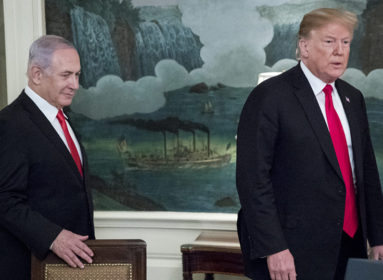By Judie Jacobson ~
FAIRFIELD – Award-winning Israeli journalist Caroline Glick is senior contributing editor for the Jerusalem Post and a former officer of the Israel Defense Forces. She served as a coordinator of negotiations with the PLO during the Oslo years, and as an assistant foreign policy adviser to Prime Minister Benjamin Netanyahu during his first term in office.
In her “Column One” in the Post, Glick has questioned the integrity of the peace process and the soundness of the two-state solution, and has focused on the existential threat posed by Iran’s pursuit of
nuclear weapons. In a review of her book, “Shackled Warrior: Israel and the Global Jihad,” Israeli human rights activist and former Soviet refusenik Natan Sharansky, wrote: “In a world of self-deception and the desire to find false comfort by escaping from the challenges facing the free world and Israel, it is important to hear the sober voice of Caroline Glick.”
Raised in Chicago, Glick made aliyah to Israel in 1991 after graduating from Columbia University. She returned to the United States for a Master’s in public policy from Harvard’s Kennedy School of
Government. A senior fellow for Middle Eastern Affairs at the Center for Security Policy in Washington, DC, Glick travels regularly to Washington where she briefs senior administration officials and members of Congress on issues of joint Israeli-American concern.
Named “The Most Prominent Woman in Israel” in 2003, she has received the Ben Hecht Award for Middle East Reporting, and the Abramowitz Prize for Media Criticism.
Caroline Glick will speak on “Israel in the Wake of the Arab Spring: An Insider’s View,” Wednesday, July 25, 7:30 p.m., at the Jewish Community Center of Eastern Fairfield County.
Recently, the Ledger spoke with Glick about what lies ahead for Israel and her Arab neighbors.
Q: You recently participated in a panel discussion on Israel’s final borders at the President’s Conference in Jerusalem, in which you put forth the notion that Israel should assert its full sovereignty over Judea and Samaria. Can you explain your position?
A: I am writing a book setting out my position now that is due to be published next year. In a nutshell, Israel has the right under international law to assert its full sovereignty over Judea and Samaria. I am convinced that it is in Israel’s best interest to do so.
Q: Does Israeli public opinion support this notion – or is the public more inclined to give these areas to the Palestinians in a final settlement?
A: The majority of Israelis are convinced that the so-called “two state solution” is a recipe for war, not peace, and do not support it. Only recently have Israelis begun to consider other options, including the application of Israeli sovereignty over all or parts of Judea and Samaria. The debate has only just begun.
Q: What is your take on the recent welcoming of Kadima into Netanyahu’s coalition? How will that affect the peace process?
A: There is no peace process since the Palestinians are completely unwilling to negotiate anything – including peace — with Israel. Kadima’s decision to join Netanyahu’s government is wholly a function of Kadima’s political weakness. In a poll out this week, Kadima is projected to drop from 29 to 5 Knesset seats in the next election, making it one of the smallest parties in Israel. By joining the
government, Kadima postponed the elections and may have paved the way for its members to rejoin Likud.
Q: In your book “Shackled Warrior: Israel and the Global Jihad,” you note that “Palestinian society itself must be transformed before there is to be peaceful coexistence.” Can you explain what you mean?
A: There are no forces in Palestinian society that accept Israel’s right to exist. Fatah doesn’t accept Israel’s right to exist. Hamas doesn’t accept Israel’s right to exist. The supposedly dovish Palestinians like Sari Nusseibah and Salam Fayyad do not accept Israel’s right to exist. Moreover, there is no significant facet of Palestinian society that believes that the use of terrorism to murder Israelis is morally objectionable. At best, the supposedly moderate Palestinians perceive terrorism as counterproductive. The supposed moderates lionize suicide bombers and other mass murderers as heroes. The Palestinian school system from nursery through university indoctrinates Palestinians to perceive death in pursuit of the murder of Jews as the highest ideal. This is not a society that is interested in
peaceful coexistence with Israel. For there to be peace, this society must be transformed.
Q: Along the same lines – does this mean, for all intent and purposes, there is not likely to be a peace? If not, can there be an absence of war or hostilities even if there isn’t a peace?
A: There can be peace under Israeli sovereignty. There can be an absence of war – as there was between 1967-1993 with complete Israeli control over Judea and Samaria. There cannot be an absence of hostilities as long as the Palestinian Authority exists. It exists to maintain and escalate the conflict with Israel with the stated aim of destroying Israel and replacing it with “Palestine.”
Q: After being declared winner of the Egyptian election, the Muslim Brotherhood’s Mohamed Morsy said his government would have to “review” his country’s treaty with Israel. What do you expect will happen? And what are your thoughts about where things are now headed in Egypt?
A: As I wrote immediately after Hosni Mubarak was forced out of power by the Obama administration in February 2010, the peace treaty between Egypt and Israel is dead in the water. I have written
extensively on the subject and people can refer to my website www.carolineglick.com for more information, but Israel’s southern front has reawakened after 30 years of relative calm. And Israel must prepare for the worst. This means, among other things, vastly increasing military spending and the size of the standing army to include at least one more regular division in the south.
Q: Recently, it seems that Israeli officials have been more vocal about the slaughter going on in neighboring Syria. Do you think that’s so – and, if so, why? What is your take on what’s happening – and what will happen – in Syria?
A: The problem with Syria is that thanks to the Obama administration’s decision to outsource the Syrian opposition to Turkey, those fighting Assad include a significant element of al Qaeda. As a consequence, all the options for the future are horrible.
Q: Can you explain to an American audience what the social protests now underway in Tel Aviv are about?
A: They are about two things. On the one hand, they are a protest against Israel’s oligarchies that keep food and other prices sky high, and therefore they are a call for further liberalization of the Israeli marketplace, including the housing market.
On the other hand, the radical Left – including the Communists – have attempted to take over the protest movement in order to both destabilize with the hope of overthrowing the government, and to roll back the free market reforms and forcing the country to revert to its former socialist economic model.
Q: Over the past couple of decades that you’ve lived in Israel, what would you say have been the major changes in the relationship between Israel and America? Do you think you look at things differently now, as opposed to when you first arrived in the country with more of an American perspective?
A: The U.S. remains Israel’s chief ally, but this doesn’t mean that the fundamentals of the relationship are necessarily healthy for Israel or for the U.S. The social changes in both countries are moving them away from one another. The rise of radical leftist political forces in the U.S. and their effective takeover of the Democratic party has made support for Israel a partisan issue. The Republicans are far more supportive of Israel today and the Democrats are far more hostile to Israel. This is having a deleterious impact on the American Jewish community that is increasingly compelled to choose between its devotion to the Democratic party and its support for Israel. In Israel, the country has moved significantly to the right since the Palestinians rejected peace and went to war against Israeli society in September 2000.
Q: What are the key issues at this point in time that American Jews should be most concerned about in terms of theIsraeli-American relationship?
A: Their key concern should be the fact that the Democratic party has become a hospitable place for antisemites.
Caroline Glick will speak on “Israel in the Wake of the Arab Spring: An Insider’s View,” Wednesday, July 25, 7:30 p.m., at the Jewish Community Center of Eastern Fairfield County, 4200 Park Ave. in Bridgeport. The event is sponsored by Congregation Beth El of Fairfield and the UJA/Federation of Eastern Fairfield County, as well as several area congregations and organizations. A dessert reception will follow. The program is free and open to the public. For more information contact Rich Frostig, richf26@optonline.net, or Judy Shapiro, judy@jnshapiro.com.








 Southern New England Jewish Ledger
Southern New England Jewish Ledger












